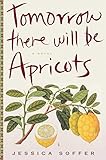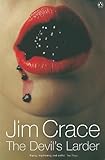 While reading Jessica Soffer’s lush and layered debut novel, Tomorrow There Will Be Apricots, I was reminded of one of those sayings you hear about life: “Life is like a box of sardines,” something, something something… Sadly, I could not remember how it finished. But I was sure it had to do with some type of fish. And so I did an Internet search for quotes about life, and what it’s like, and I found life is indeed like a box of sardines (according to Alan Bennett), but it’s also apparently like: chocolates (Forrest Gump), artichokes (Thomas Aloysius Dorgan), pasta (Fellini), pudding (W.S. Gilbert), soup (Flaubert), an onion (Carl Sandburg), and a bowl of cherries (Erma Bombeck). There is a pattern here.
While reading Jessica Soffer’s lush and layered debut novel, Tomorrow There Will Be Apricots, I was reminded of one of those sayings you hear about life: “Life is like a box of sardines,” something, something something… Sadly, I could not remember how it finished. But I was sure it had to do with some type of fish. And so I did an Internet search for quotes about life, and what it’s like, and I found life is indeed like a box of sardines (according to Alan Bennett), but it’s also apparently like: chocolates (Forrest Gump), artichokes (Thomas Aloysius Dorgan), pasta (Fellini), pudding (W.S. Gilbert), soup (Flaubert), an onion (Carl Sandburg), and a bowl of cherries (Erma Bombeck). There is a pattern here.
 A favorite and more knotty take is from Jim Crace’s wonderful cornucopia of a book The Devil’s Larder, a collection of riffs and vignettes all having to do with meals and booze. In one, he ponders a lone enigmatic tin can, no label, found sitting in a cupboard: “It’s tempting just to stab it with a knife. Wound it. See how it bleeds. What is the color of the blood? What is its taste? We should all have a can like this…The choice is wounding it with knives, or never touching it again.” This gets much closer, I think, to the essence of food and our fraught relationship with it. Food is mystery. It’s sensual, decadent, delicious, and healthful — yes — but also allergy, gluttony, poison, and pain. It’s one of memory’s fastest streets, and delivers life-sustaining and death-haunted thoughts, depending. This is the food of Soffer’s story, which feels like one of Crace’s lovely vignettes, given sufficient room to grow.
A favorite and more knotty take is from Jim Crace’s wonderful cornucopia of a book The Devil’s Larder, a collection of riffs and vignettes all having to do with meals and booze. In one, he ponders a lone enigmatic tin can, no label, found sitting in a cupboard: “It’s tempting just to stab it with a knife. Wound it. See how it bleeds. What is the color of the blood? What is its taste? We should all have a can like this…The choice is wounding it with knives, or never touching it again.” This gets much closer, I think, to the essence of food and our fraught relationship with it. Food is mystery. It’s sensual, decadent, delicious, and healthful — yes — but also allergy, gluttony, poison, and pain. It’s one of memory’s fastest streets, and delivers life-sustaining and death-haunted thoughts, depending. This is the food of Soffer’s story, which feels like one of Crace’s lovely vignettes, given sufficient room to grow.
The story proper belongs to Lorca, a 14-year-old girl, raised by her mother, a famous chef, and to Victoria, a recently widowed ex-chef, who has just lost her husband to cancer. Both live in New York City. Lorca is precocious in all the right ways, curious, intelligent, funny, and mature. She also wants nothing more that to crack her mother’s icy exterior — “I had a habit of asking her if she loved me. She had a habit of not answering.” She does so by worshipfully watching and copying her mother’s every move in the kitchen (a real chef in the making), oh, and by cutting her own body. In fact, the opening scene tells of Lorca’s suspension from school (and subsequent threats to send her away) because a classmate found Lorca, in the bathroom: “with my skirt high up, my tights down, my shoeless foot on the toilet seat, the paring knife to my thigh.” Lorca is a self-harmer, a cutter, and Soffer’s depiction of her cutting is admirably unflinching. There are the secreted tools she prefers, box cutters, nail clippers, razors. And yes there is blood. At one especially bad time, the poor thing looks as if “splattered with someone else’s death.” This isn’t easy reading, and there are readers who will be surprised by it in a book so sunny.
Yes, sunny. Because despite her “problem,” Lorca’s just a kid, a good kid, and so her days are also filled with thoughts of school, and what she wants to be when she grows up, and boys (she’s in love with a 19-year named Blot), and the dream of making her mother’s favorite dish, masgouf, Iraqi grilled carp.
Victoria, an Iraqi-Jewish immigrant, is headstrong and lonely, even before she loses her husband after his long sickness. This happens in the first few pages and comes as no surprise. What does surprise is her reaction; painfully in mourning, she refuses sentimentality. Unable to leave the apartment, those first few days, she is goaded by a meddlesome neighbor into conducting a cooking class in her home. Lorca finds a flyer advertising the class, and decides Victoria (for lots of reasons) will teach her the secrets of a perfected masgouf.
Like a double helix, the novel is narrated by mostly these two voices of significantly different generations, leading the reader toward what seems the inevitably heartwarming and redemptive conclusion: are Victoria and Lorca more than just neighbors? Are they family? Will a well-prepared dish fix all?
 You can’t help but think of Nicole Krauss’s wildly popular novel, The History of Love when reading Tomorrow There Will Be Apricots, and yet what Soffer does so well here is employ that same sort of familiar structure, while quietly undermining its typical devices. A novel about food becomes so much more than some simple story of domestic affirmation found in the kitchen (where it was waiting all along…) because, in the end, we always have Grandma’s recipe tin. Instead, it becomes a story of food’s very foundational and fluid place in our understanding of the world. Here is Victoria on her husband’s remains:
You can’t help but think of Nicole Krauss’s wildly popular novel, The History of Love when reading Tomorrow There Will Be Apricots, and yet what Soffer does so well here is employ that same sort of familiar structure, while quietly undermining its typical devices. A novel about food becomes so much more than some simple story of domestic affirmation found in the kitchen (where it was waiting all along…) because, in the end, we always have Grandma’s recipe tin. Instead, it becomes a story of food’s very foundational and fluid place in our understanding of the world. Here is Victoria on her husband’s remains:
What would I carry him home in?…A shopping bag? A cashmere shawl? What could bear the weight of him, of everything he did? Nothing felt right…I couldn’t bear the thought of him like that — like almond meal, cake flour, or sand.
There is also the masgouf itself, the National Dish of Iraq, which serves not only as the object of Lorca’s mission, but enables Soffer to sneak in the undercurrent of a relevant political narrative. Soffer herself is of Iraqi-Jewish heritage, and knows all too well the story of her father’s emigration to the United States after the Jewish expulsion from Iraq. Most fled for Israel, but some chose the States, finding little community here. Or anywhere really. The Iraqi Jewish identity is a rare one. Recent reports put as little as 100 Jews left currently living there. It’s a sadly fading perspective, much like masgouf itself, a dish now impossible to cook in the traditional style. As Victoria tells Lorca, since the fish must be caught in the Tigris or Euphrates, “no one will ever eat this meal the same way again. As we did growing up. With all the dead bodies in the rivers, they’ve declared a fatwa on the fish.”
A notion like this is good warning against nostalgia. In fact, much of the book does the same: upending comfortable notions of womanhood, motherhood, and what makes for a nurturing family. What is perhaps most remarkable about Tomorrow There Will Be Apricots is the ways in which it resembles what reviewers like to lazily think of as “women’s fiction,” even as it dispels those very trappings. This is story about family and love, and how food feeds both of these, but also a story of loss and pain and the empty stomachs of those still learning how to feel. For that I find it, much like life, alive and sobering, buoyant and blue, at times dark, but only until the light fills the room.








